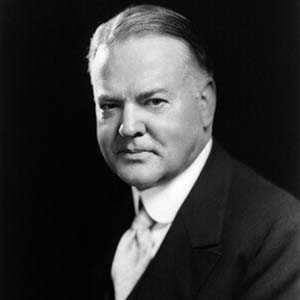Herbert Hoover served as the 31st President of the United States, serving from 1929-1934. While he was an accomplished engineer, humanitarian, and politician, he is most remembered for failing to lift the country out of the Great Depression.
Early Years and Humanitarian Work
Herbert Clark Hoover was born into a family of Quakers on August 10, 1874, in West Branch, Iowa. In 1891, Hoover was a member of the first class to enter Stanford University. He used his degree in geology to build a successful mining business that took him all over the world.
When World War I broke out in Europe, Hoover helped 120,000 stranded American tourists get back to the U.S. He then devoted his attention to getting food and supplies to Belgium, which had been overrun by the German army. After the U.S. entered the conflict, President Wilson appointed Hoover to lead the Food Administration. He was able to successfully reduce the consumption of food needed overseas without rationing and provided much-needed supplies to the Allied Forces. Hoover subsequently served as Secretary of Commerce under President Warren Harding. He was reappointed to the position under President Calvin Coolidge.
Presidency through Great Depression
In the election of 1928, Hoover defeated Democratic nominee Alfred E. Smith by a record margin of 444-87 electoral votes. However, just a few months after President Hoover took office, the stock market plummeted, hurling the country into the Great Depression. The Hoover Administration took several steps to stimulate the economy, including cutting taxes and increasing public works spending.
As the economy continued to decline, unemployment reached 23 percent in 1932, and thousands of Americans lost their homes, forced to live in shanty towns known as “Hooverville’s.” While President Hoover launched numerous programs to bring the country out of the depression, he also favored voluntary, local aid over broad government intervention. “Prosperity cannot be restored by raids upon the public Treasury,” he stated in his 1930 State of the Union address.
Hoover’s critics characterized him as callous and insensitive toward the plight of millions of suffering Americans. In the election of 1932, Franklin D. Roosevelt beat Hoover in a landslide. Once out of office, Hoover was a vocal critic of FDR’s New Deal policies. When Harry S. Truman was elected, Hoover was appointed to lead the Hoover Commission, which aimed to improve the efficiency the federal government. He served as chairman of a similar commission under President Dwight Eisenhower in 1953. Hoover died in 1964 at the age of 90.









